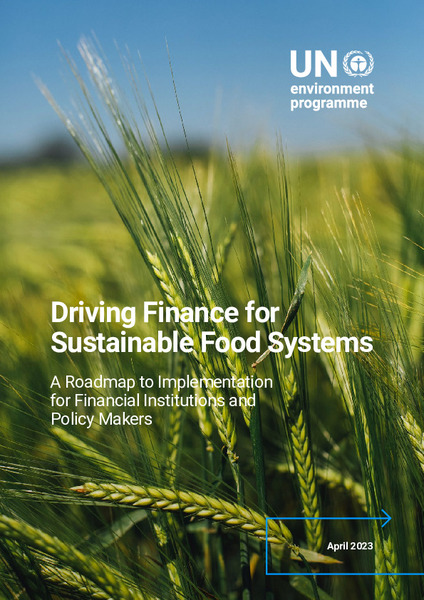| dc.contributor | Industry and Economy Division | en_US |
| dc.contributor.author | United Nations Environment Programme | en_US |
| dc.contributor.other | Osuna, Vanesa Rodríguez | en_US |
| dc.contributor.other | Wiese, Alexander 'Sasha' | en_US |
| dc.contributor.other | Buso, Tommaso | en_US |
| dc.contributor.other | Karapinar, Baris | en_US |
| dc.contributor.other | Smith, Jessica | en_US |
| dc.contributor.other | Fisher, Remco | en_US |
| dc.contributor.other | Mulder, Ivo | en_US |
| dc.contributor.other | Gambarelli, Gretel | en_US |
| dc.date.accessioned | 2023-04-20T20:41:02Z | |
| dc.date.available | 2023-04-20T20:41:02Z | |
| dc.date.issued | 2023-04 | |
| dc.identifier.isbn | 978-92-807-4021-9 | en_US |
| dc.identifier.other | DTI/2519/PA | en_US |
| dc.identifier.uri | https://wedocs.unep.org/20.500.11822/42230 | |
| dc.description | Food systems play a central role in all societies and are fundamental to sustainable development. Sustainable food systems (SFS) are vital to addressing issues of food security, social equity, poverty alleviation and healthy diets, and are key to building resilience
in communities facing a rapidly changing global environment. The environmental and social impacts of the global food system are interconnected and affect diverse impact areas ranging from climate change mitigation, adaptation, biodiversity, resource efficiency and the circular economy, as well as social dimensions including human rights, labour conditions and gender equality. This roadmap aims to: 1) raise awareness of the importance and role of the agrifood sector in solving the triple planetary crisis as well as contributing to sustainable development; 2) provide an overview of the key opportunities for financial institutions to enhance financial flows to sustainable food systems (through impact management and targets, risk mitigation strategies and financial innovation); and 3) foster an enabling environment for driving capital towards sustainable food systems. | en_US |
| dc.format | pdf | en_US |
| dc.language | English | en_US |
| dc.rights | Public | en_US |
| dc.subject | food security | en_US |
| dc.subject | sustainable consumption | en_US |
| dc.subject | financing | en_US |
| dc.subject | risk management | en_US |
| dc.subject | debt service | en_US |
| dc.subject | financial instrument | en_US |
| dc.subject | sustainable finance | en_US |
| dc.title | Driving Finance for Sustainable Food Systems: A Roadmap to Implementation for Financial Institutions and Policy Makers | en_US |
| dc.type | Publications | en_US |
| dc.type | Non-technical Handbooks, Guidelines, Manuals, Toolkits | en_US |
| wd.identifier.sdg | SDG 2 - Zero Hunger | en_US |
| wd.identifier.sdg | SDG 9 - Industry, Innovation and Infrastructure | en_US |
| wd.identifier.sdg | SDG 12 - Responsible Consumption and Production | en_US |
| wd.topics | Finance and Economic Transformations | en_US |
| wd.identifier.pagesnumber | 78 p. | en_US |
| dc.relation.TableOfContents | Introduction: Interwoven challenges and impact opportunities in food systems | en_US |
| dc.relation.TableOfContents | Financiers: Identify and assess impact, set targets, monitor progress and achieve impact | en_US |
| dc.relation.TableOfContents | Credit risk mitigation and financial innovation for sustainable food systems | en_US |
| dc.relation.TableOfContents | Enabling policy environment to promote sustainable finance for food systems | en_US |
| wd.identifier.doi | https://doi.org/10.59117/20.500.11822/42230 | |


